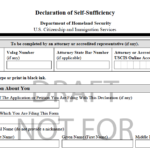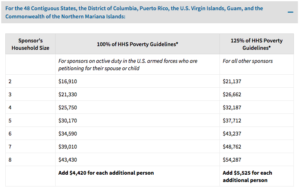I-944: What is it and How it affects Green Card Filings

Effective October 15, 2019, USCIS will require a more enhanced way to screen the financial stability of the Petitioner and of the Beneficiary of a Green Card, Adjustment of Status Filing. This change arises from the August 14, 2019 publication of the Final Rule on Public Charge Ground of Inadmissibility. USCIS will release and mandatorily review a new thorough form: I-944
With the introduction of the I-944, the current and long-standing screening in the I-864 (and I-864P Guidelines) will be improved. Which, if not known, for years the I-864 filing assessed the past 3 years of Tax Returns and IRS Transcripts, Business Stability for Self Employed Situations, Special Military Veteran Income, Retirement Income, Assets, and Paystubs.
Now, the I-944 process will basically require the following:
- Credit Report (Helpful Link found here: www.AnnualCreditReport.com )
- Recent Bank Statements for all accounts
- Proof of any Stock and Retirement Account
- Proof of any asset that has a taxable monetary value (e.g. a house, but not personal items like spare tire rims or your t.v.)
- 12 Months of Paystubs, or if less than 12 exist, a Letter from Employer stating pay rate, job title, job duties, the start of employment, and any information if employment has an end date or a statement that the employment is not expected to end anytime soon.
- Recent Statements for every debt (e.g. Credit Card, Car Loan, Mortgage)
I-944 compared to the long-standing I-864
So, instead of Immigration trying to fumble through old and mix-matched documents in the I-864 Filing, the US Government will rely on Credit Reporting Agencies and their wealth of simultaneous, to-the-second records. It might seem strange that USCIS is literally asking for everything, or it might appear that immigration is asking for a lot of personal items. However, this change and shift in enhanced tactics can actually make the process easier for the military and many filers.
For years, the I-864 has been difficult. Even millionaires can have a hard time proving an income of $22,000 – $50,000, since an Immigration Officer can have a difficult time deciphering assets, trusts, and retirement accounts. USCIS has frequently issued RFEs (Requests for Evidence) to explain financial stability, financial documents, and forecast how stable income/assets will be in the future.
The I944 will help remove a lot of doubt in someone’s financial stability. If a car salesman can see someone’s credit report, they feel comfortable giving the vehicle keys to someone. If a loan company can see someone’s credit report, they quickly give money to someone. If a management office for an apartment complex can see someone’s credit report, they feel comfortable giving a lease to someone. In essence, everyone frequently provides their credit report to companies and stores. Providing the Credit Report to the US Government seems positive since they can instantly trust you, trust financial stability, and give a Green Card.
If the I-944 implementation can avoid delays from I-864 filings, something like giving a credit report looks small. (Note: the I-864 RFE Delay could add 1 month to 1 year of extra processing time). Faster USCIS I-485 Adjustment of Status filings means many spouses, children, and parents of US Citizens and Lawful Permanent Residents can receive the Green Card much quicker.
What About Filings submitted before October 15, 2019?
The I-864 Affidavit of Support would still require Tax Returns and IRS Transcripts, proof of Income, Assets, and Paystubs. An I-944 form would likely not be needed. However, acquiring a Credit Report, to be taken to a USCIS AOS interview, might be beneficial. Even though it may not be required, a USCIS Officer can always request any documentation.
What if my income is low?
Unfortunately, the October 15, 2019 change may make the Immigration Process extremely difficult and provide a higher chance of denial. If USCIS does not trust someone’s income, USCIS may require a Bond at $8100 to be posted, and that may be returned or forfeited over the next 3 to 10 years. Which a “public charge bond” was rare and almost never heard of prior to October 2019. So, this may possibly be the implementation of an old, on-the-books tool long-held by the US Government and USCIS.
For filings submitted before October 15, 2019, it is expected that financial stability will be re-evaluated more harshly and officers can ask for updated documents.
How do I assess my income?
2019 I-864P for all areas besides Alaska and Hawaii
Poverty may sound bad, but that is the test used by USCIS. Every Green Card filing has to assess someone’s relativity to poverty.
- For Active-Duty Military filing for a spouse or child, they pass if their income is 100% at the poverty level.
- All others must overcome the poverty level by 125%
The I-864P is the Poverty Level Guideline used in all Green Card Filings (helpful link here: https://www.uscis.gov/i-864p )
The Income Amount is normally found on all 1040 tax returns or IRS transcripts. It is the Adjusted Gross Income. A comparable “number” is the expected annual income derived from paystubs.
What if the Income is over 250% of the Poverty Level?
USCIS will likely create a presumption of Strong Financial Stability, meaning an easier adjudication and likely quicker processing times.
What if I am under 125% of the Poverty Level?
Filings under the 125% (or 100% for Active-Duty Military filing for a spouse or child) of the poverty level are denied. Petitioners who do not meet the income requirement would require a co-sponsor. So, there is hope, but another sponsor is needed. Additionally, USCIS may require a Bond at $8100 to be posted.
A Little About Our Office
Fickey Martinez Law Firm, P.L.L.C. is an Immigration Law Firm located in Eastern North Carolina. We have four office locations. We offer services in many areas of immigration law, such as military immigration (which can apply to a service member’s family), green card filings, and naturalization. If you would like to speak with an immigration attorney, please contact our office to set up a consultation.
Disclaimer: This Blog is made available by the lawyer or law firm publisher for educational purposes only as well as to give you general information and a general understanding of the law, not to provide specific legal advice. By using this blog site you understand that there is no attorney-client relationship between you and the Blog/Web Site publisher. The Blog should not be used as a substitute for competent legal advice from a licensed professional attorney in your state.
The post I-944: What is it and How it affects Green Card Filings appeared first on Fickey Martinez Law Firm.













